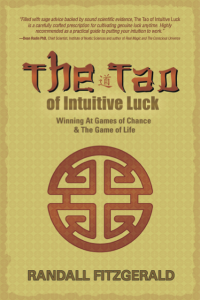Frequently Asked Questions
Aug 06, 2023 by Randall Fitzgerald
Is your primary focus on gambling luck?
No, I am most interested in how each of us can create good fortune in all aspects of life using the five intuitive luck principles.
Gambling and similar forms of risk-taking—including speculation in the stock market---are treated in my book as convenient vehicles for testing chance, as metaphors for life with clear win and loss outcomes, that enable us to keep score in our own personal experiments with what intuition strategies work best for us.
Intuitive luck and its five principles are based on decades of credible scientific research. These findings support the use of specific practices and techniques for developing and using your intuitive gifts in the pursuit of wisdom, happiness and prosperity.
How does your intuitive luck idea differ from ordinary intuition?
Some psychologists define intuition solely in terms of being a process of the ‘adaptive unconscious’ in which the unconscious mind spontaneously draws upon the sum total of our experiences and knowledge to make accurate split-second observations and decisions. They concede that such snap judgments can often be as valuable and accurate as weeks of rational analysis. This is what I refer to as Level One, or ‘ordinary’ intuition.
What proponents of a narrow definition of intuition fail to appreciate is a growing mass of scientific evidence that the human body processes intuitive information seconds (or more) before our conscious mind is aware of it, and often does so without resort to previous experience or knowledge. This is Level Two transcendent intuitive ability. It alerts us to luck opportunities and it can be willfully summoned in our dreams, as waking premonitions, and as meaningful patterns of coincidences for use as signposts (the Tao) to good fortune.
Laboratory research offers support to this idea by showing us how our bodies relentlessly scan the future for threats and opportunities. The signal strength of these scans can vary according to the emotional charge attached. Some of us feel this intuitive signal information most acutely in our gut, the classic ‘gut hunch,’ while others of us feel it more often in our hearts, or as a mental sense of knowing.
Intuitive Luck is about mastering proven techniques so we are able to improve our ability to channel and feel intuition in our bodies, to accurately interpret the messages we receive, and then to take actions necessary to enhance our experience of life.
Do your readers run the risk of compulsive gambling and addiction?
Any mental discipline used to separate genuine intuition from wishful thinking and habits of mind needs to be effective enough to take into account the human capacity for compulsions and addiction. Most people are able to immunize themselves against falling prey to persistent toxic states of mind, otherwise, membership in Gambler’s Anonymous would far exceed the numbers of people testing their luck in casinos and other venues where chance operates.
But it’s also true that everyone, problem gamblers or not, stand to benefit from the mind and emotion control techniques described in The Tao of Intuitive Luck. Anyone can unwittingly fall prey to what I label as The Cosmic Trickster—the capacity to deceive oneself-- unless some simple and practical behavioral guardrails of techniques and exercises are put into place, as this book provides.
‘Know Thyself’ was the admonition to visitors inscribed in stone outside the ancient Greek temples of dream interpretation at Delphi and elsewhere. The idea being that to derive the most value from a seer’s predictions based on your dreams you needed knowledge about your own mind and how it shapes your thoughts and actions. That’s also true in pursuing good fortune using intuitive luck. To read the signposts, to follow the path (the Tao), and fully and consistently reap the benefits from a relationship with Lady Luck, learn to Know Thyself, your strengths and weaknesses, is always a beneficial place to start.
No, I am most interested in how each of us can create good fortune in all aspects of life using the five intuitive luck principles.
Gambling and similar forms of risk-taking—including speculation in the stock market---are treated in my book as convenient vehicles for testing chance, as metaphors for life with clear win and loss outcomes, that enable us to keep score in our own personal experiments with what intuition strategies work best for us.
Intuitive luck and its five principles are based on decades of credible scientific research. These findings support the use of specific practices and techniques for developing and using your intuitive gifts in the pursuit of wisdom, happiness and prosperity.
How does your intuitive luck idea differ from ordinary intuition?
Some psychologists define intuition solely in terms of being a process of the ‘adaptive unconscious’ in which the unconscious mind spontaneously draws upon the sum total of our experiences and knowledge to make accurate split-second observations and decisions. They concede that such snap judgments can often be as valuable and accurate as weeks of rational analysis. This is what I refer to as Level One, or ‘ordinary’ intuition.
What proponents of a narrow definition of intuition fail to appreciate is a growing mass of scientific evidence that the human body processes intuitive information seconds (or more) before our conscious mind is aware of it, and often does so without resort to previous experience or knowledge. This is Level Two transcendent intuitive ability. It alerts us to luck opportunities and it can be willfully summoned in our dreams, as waking premonitions, and as meaningful patterns of coincidences for use as signposts (the Tao) to good fortune.
Laboratory research offers support to this idea by showing us how our bodies relentlessly scan the future for threats and opportunities. The signal strength of these scans can vary according to the emotional charge attached. Some of us feel this intuitive signal information most acutely in our gut, the classic ‘gut hunch,’ while others of us feel it more often in our hearts, or as a mental sense of knowing.
Intuitive Luck is about mastering proven techniques so we are able to improve our ability to channel and feel intuition in our bodies, to accurately interpret the messages we receive, and then to take actions necessary to enhance our experience of life.
Do your readers run the risk of compulsive gambling and addiction?
Any mental discipline used to separate genuine intuition from wishful thinking and habits of mind needs to be effective enough to take into account the human capacity for compulsions and addiction. Most people are able to immunize themselves against falling prey to persistent toxic states of mind, otherwise, membership in Gambler’s Anonymous would far exceed the numbers of people testing their luck in casinos and other venues where chance operates.
But it’s also true that everyone, problem gamblers or not, stand to benefit from the mind and emotion control techniques described in The Tao of Intuitive Luck. Anyone can unwittingly fall prey to what I label as The Cosmic Trickster—the capacity to deceive oneself-- unless some simple and practical behavioral guardrails of techniques and exercises are put into place, as this book provides.
‘Know Thyself’ was the admonition to visitors inscribed in stone outside the ancient Greek temples of dream interpretation at Delphi and elsewhere. The idea being that to derive the most value from a seer’s predictions based on your dreams you needed knowledge about your own mind and how it shapes your thoughts and actions. That’s also true in pursuing good fortune using intuitive luck. To read the signposts, to follow the path (the Tao), and fully and consistently reap the benefits from a relationship with Lady Luck, learn to Know Thyself, your strengths and weaknesses, is always a beneficial place to start.

